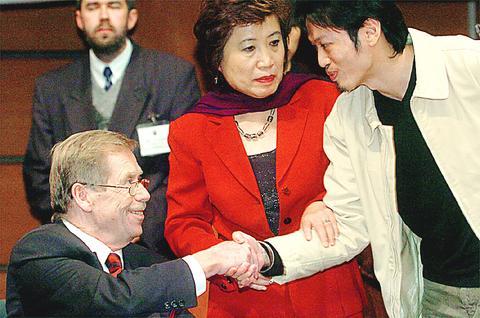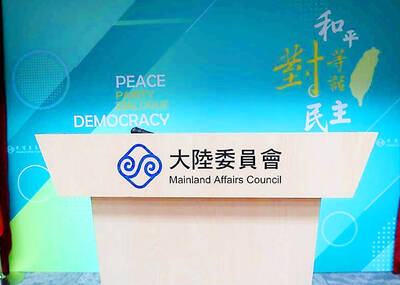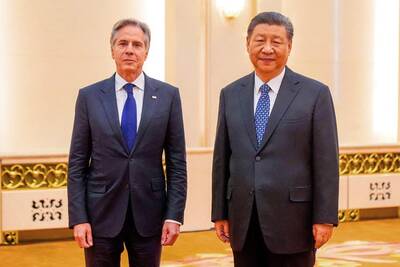President Chen Shui-bian (
Sitting in a wheelchair, Havel received the medal at the Presidential Office. The ceremony was also attended by first lady Wu Shu-chen (

PHOTO: SEAN CHAO, TAIPEI TIMES
Forced to take a light schedule in Taiwan because of his delicate health, Havel stumbled at the hotel he was staying at and hurt his feet on Sunday, the Ministry of Foreign Affairs said when explaining why Havel needed a wheelchair.
"It is my greatest honor to meet with a world-class writer, thinker, political leader and noble dissident. I am deeply sorry for Mr. Havel's injured feet and offer my apologies. I wish our guest can recover as soon as possible," Chen Shui-bian said after bestowing the medal on Havel.
The president expressed gratitude for Havel's public support for Taiwan's participation in the UN during the world body's general assembly in 1995.
"Our guest today has a deep understanding of universal values such as human rights. He said `human life, human freedom and human dignity represent higher values than state sovereignty' and that `while the state is a human creation, human beings are the creation of God.' I highly admire his thoughts," Chen Shui-bian added.
Havel said that although the Czech Republic is far away from Taiwan, they have many things in common.
"We are both democratic states. I admire the people of Taiwan and the economic development here," he said.
"It was my bad luck that I got hurt. I often get hurt when visiting other countries. It is not Taiwan's fault," Havel said.
"Although Taiwan faces a difficult situation in the international community, its people have been courageous. I believe Taiwan should join the UN. I supported Taiwan's entrance to the UN in the past. I still support its participation in the UN and will do so in the future," Havel said.
Havel gave his only public speech in Taiwan at the National Central Library on globalization and the future of democracy yesterday afternoon.
Mark Chen, Czech Republic's representative to Taiwan Michal Kral, Maysing Yang (
Chiu, whose university performed Havel's drama The Increased Difficulty of Concentration for him on Sunday, said although the play shows the influence of the theater of the absurd, Havel does not exhibit the despair writers who try to catch the sense of the absurd usually betray.
"The play highlights modern people's emptiness and complicated lives. Havel is obsessed with words, yet he strongly distrusts words. He uses a lot of cliches in the play. These cliches contain deep meanings," Chiu said.
"No matter what he went through, he never stopped writing. Havel believes a writer should not confine his whole time to literary creation only -- that would hurt literature. For him, a writer is the conscience of the society. He is a writer and a statesman," Havel said.
Havel received a standing ovation as he entered into the library's packed auditorium in a wheelchair. Thanking the kindness of his host, the TFD, Havel said he has traveled to more than 50 countries in different continents and that he found the world is struggling to find a new order.
"I am trying to realize what is the most important element in this new order," Havel said. "People should respect each other and not force others to change their views. Everyone is absolutely equal."

Taiwan Semiconductor Manufacturing Co (TSMC, 台積電) on Wednesday said that a new chip manufacturing technology called “A16” is to enter production in the second half of 2026, setting up a showdown with longtime rival Intel over who can make the fastest chips. TSMC, the world’s biggest contract manufacturer of advanced computing chips and a key supplier to Nvidia and Apple, announced the news at a conference in Santa Clara, California, where TSMC executives said that makers of artificial intelligence (AI) chips will likely be the first adopters of the technology rather than a smartphone maker. Analysts said that the technologies announced on

NO RECIPROCITY: Taipei has called for cross-strait group travel to resume fully, but Beijing is only allowing people from its Fujian Province to travel to Matsu, the MAC said The Mainland Affairs Council (MAC) yesterday criticized an announcement by the Chinese Ministry of Culture and Tourism that it would lift a travel ban to Taiwan only for residents of China’s Fujian Province, saying that the policy does not meet the principles of reciprocity and openness. Chinese Deputy Minister of Culture and Tourism Rao Quan (饒權) yesterday morning told a delegation of Chinese Nationalist Party (KMT) lawmakers in a meeting in Beijing that the ministry would first allow Fujian residents to visit Lienchiang County (Matsu), adding that they would be able to travel to Taiwan proper directly once express ferry

CALL FOR DIALOGUE: The president-elect urged Beijing to engage with Taiwan’s ‘democratically elected and legitimate government’ to promote peace President-elect William Lai (賴清德) yesterday named the new heads of security and cross-strait affairs to take office after his inauguration on May 20, including National Security Council (NSC) Secretary-General Wellington Koo (顧立雄) to be the new defense minister and former Taichung mayor Lin Chia-lung (林佳龍) as minister of foreign affairs. While Koo is to head the Ministry of National Defense and presidential aide Lin is to take over as minister of foreign affairs, Tsai Ming-yen (蔡明彥) would be retained as the nation’s intelligence chief, continuing to serve as director-general of the National Security Bureau, Lai told a news conference in Taipei. Koo,

MANAGING DIFFERENCES: In a meeting days after the US president signed a massive foreign aid bill, Antony Blinken raised concerns with the Chinese president about Taiwan US Secretary of State Antony Blinken yesterday met with Chinese President Xi Jinping (習近平) and senior Chinese officials, stressing the importance of “responsibly managing” the differences between the US and China as the two sides butt heads over a number of contentious bilateral, regional and global issues, including Taiwan and the South China Sea. Talks between the two sides have increased over the past few months, even as differences have grown. Blinken said he raised concerns with Xi about Taiwan and the South China Sea, along with China’s support for Russia and its invasion of Ukraine, as well as other issues